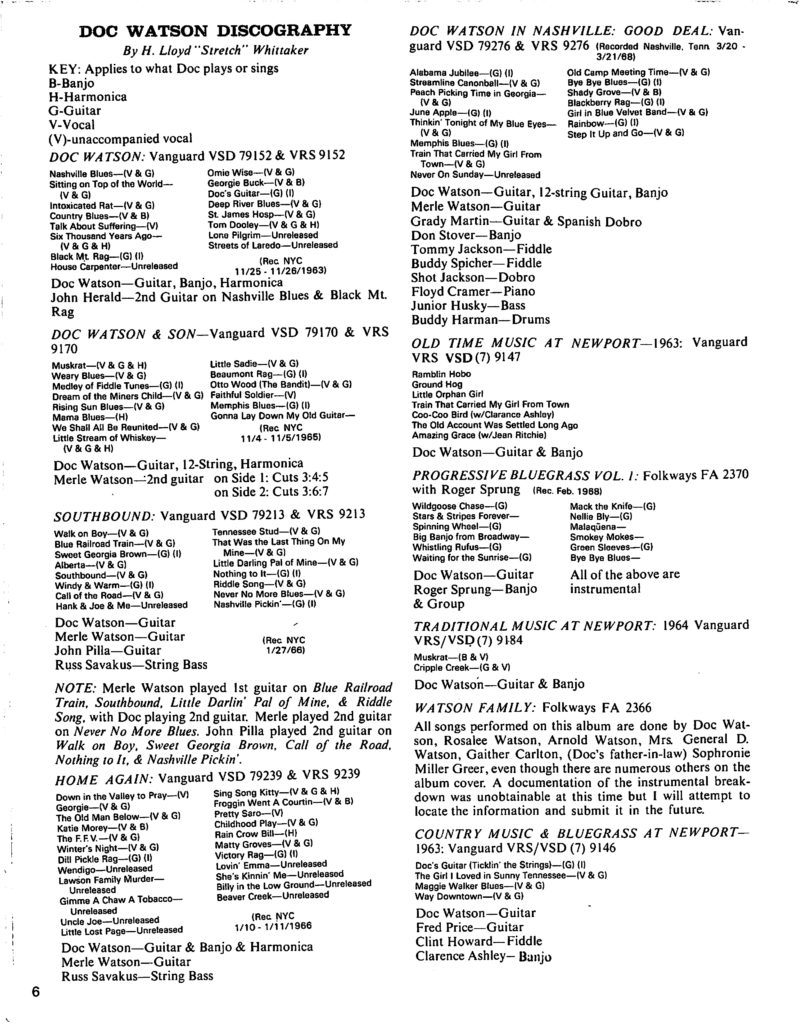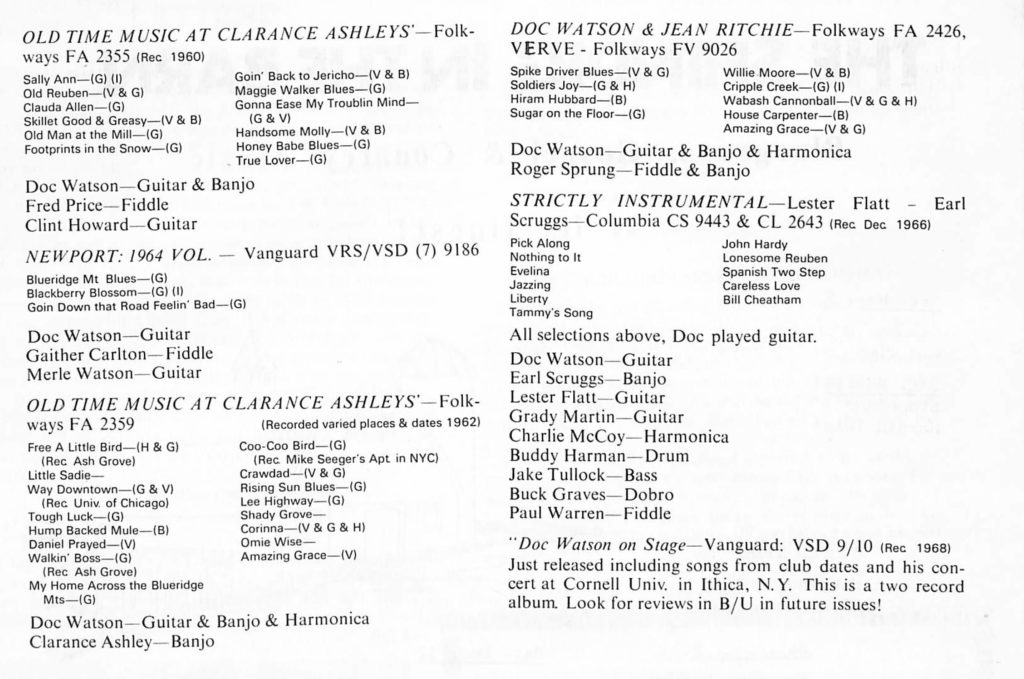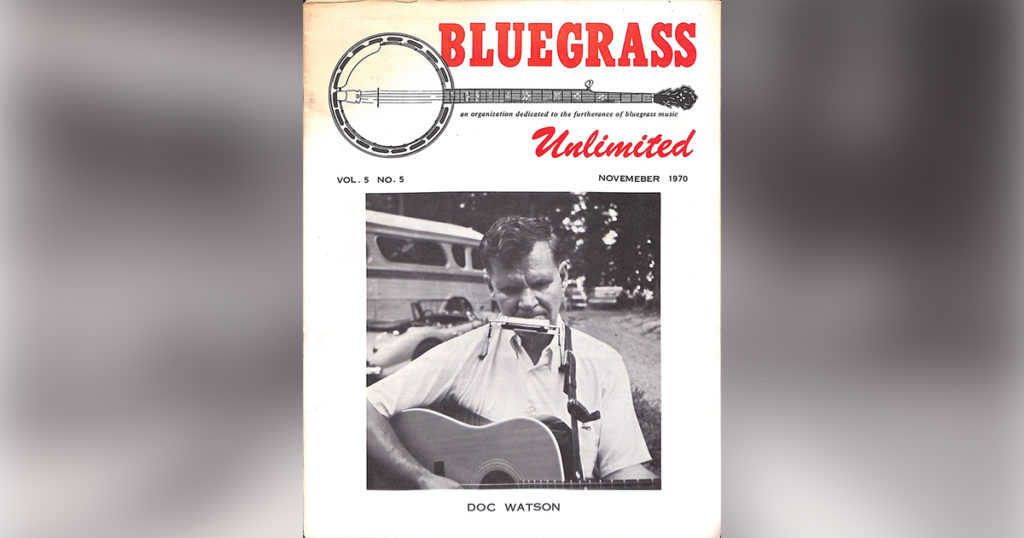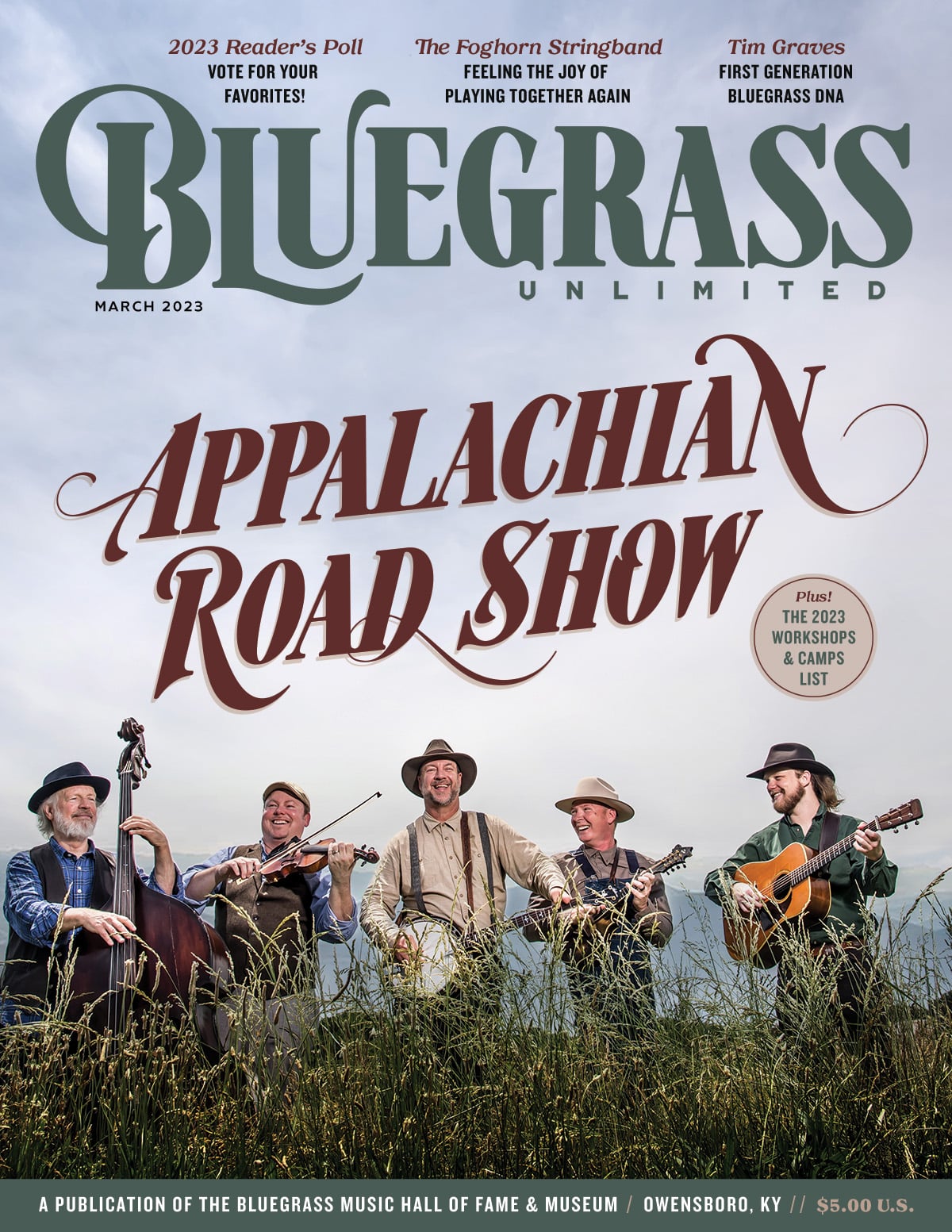Home > Articles > The Archives > Doc Watson
Doc Watson
Reprinted From Bluegrass Unlimited Magazine
November 1970, Volume 5, Number 5
It became very obvious after spending hours talking with Doc and compiling page upon page of notes, that the hardest part of this article would be to construct a satisfactory introduction; an introduction which would serve as a solid foundation upon which to build the growth of Doc’s music. Do we approach his life from the viewpoint that Doc is blind and therefore we should accept his music because of this disability? This is definitely not the way to write or explain his music and/or his life, with Doc being the first to clarify that point. Mr. A. L. Lloyd made probably the ablest of all observations in regards to Doc stating, “He’s a big, self-reliant fellow, totally unperturbed by darkness, handling his life with the same sureness, ease and delicacy with which he handles his guitar, banjo and rich, strong voice”. This is the way Doc handles his life and we would be going against his way of thinking if we were to react differently!
Arthel (Doc) Watson was born on March 3, 1923 over 3,000 feet up in the Blue Ridge mountains in the little community of Deep Gap, N.C. located in Stoney Fork Township. Doc received his education at the State School for the Blind, Raleigh, N.C. His mother was considered an excellent ballad singer and his father a very capable banjo player. Doc learned banjo from his father at age ten, and started learning guitar at age thirteen. Doc remembers his dad building his first banjo by, “bending a piece of hickory boiled in water, stretching a cat skin over it for a head, and carving a neck and pegs out of maple. On top of everything else the banjo was fretless.” Doc then spent much of his time learning old time banjo tunes, and some old fiddle tunes which he played on the harmonica. As a boy, he said he looked forward to Christmas with great anticipation because his dad made a point of giving him a new harmonica each Christmas. A few years later Doc borrowed his cousin’s guitar simply “for something to do”. His dad said if he were to learn a song on the guitar within a week, he would buy Doc a guitar of his own. Needless to say, that evening Doc played a tune on the guitar and about a week later, had his own—a Harmony which cost $12.00. Like all musicians, always in search of a more superior instrument. Doc purchased his second guitar – a Silvertone – at age sixteen, and soon began playing with his brother Linney, picking twin guitars and singing two-part harmonies.
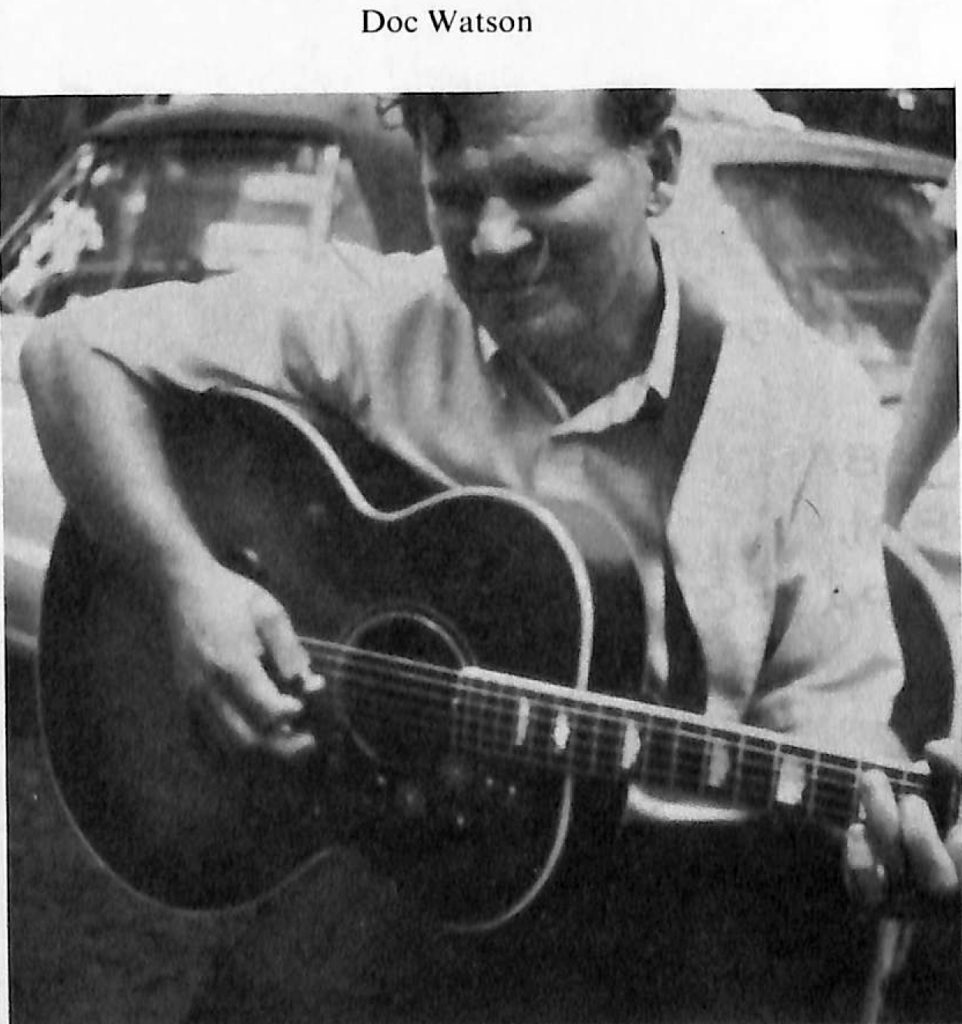
As the years past, Doc drew more and more material from early recordings, live “Grand Ole Opry” shows and from his parents to complete his vast knowledge of the music, the people, and their way of living. I believe at this time, it is imperative to stress one very important point. Doc refers to his music, in association with his upbringing, as “old time country and/or traditional”; he does not profess to be a “purist” by any means. He has developed his knowledge of both popular and jazz guitar styles, not to mention his mastery of both flat-picking and finger styles. I believe that possibly the best description of Doc’s knowledge of music is described by Ralph Rinzler; “Doc has all the earmarks of an academic’s ideal ‘folk informant’ but along with these, he has the perspective and insight of the ideal academic folklorist and the training to match the best jazz guitarists . . . and could have easily entered the field of pop music or jazz and been welcomed by his colleagues in that field.”
When I confronted Doc with the question as to who had the greatest influence upon his music, I expected the question to be deliberated for quite a period of time; however, his answer was very spontaneous and definite; The Delmore Brothers and Merle Travis. Doc spent many years learning the Delmore Brothers songs while trying to master the sound of the tenor guitar and the six string on one guitar. Doc finally mastered what he called a “thumb-backup” for rhythm and lead or melody with the first finger. This, along with the Travis style, will always remain a trademark of Doc’s greatness. But these men are only a few of the many musicians who influenced Doc’s thinking; however, there is one person to whom Doc says he owes 90% of his success. Ralph Rinzler, known to many bluegrassers as being associated with the Greenbrier Boys of years past and now a director in the Performing Arts section of the Smithsonian Institution in Washington, D.C., met and recorded Doc and his family in September 1960. Doc credits much of his urging to perform and his success to Ralph and the many years Mr. Rinzler put into establishing Doc in the profession. I am sure that the friendship between the two men will be one of unending years.
Another interesting point is the origin of the name “Doc”. He was playing a radio show from Lenoir, N.C. about twenty miles from his home with Paul Grier, an eighteen year old musician; who asked Doc if he had a nickname … Arthel was a little overpowering. At the same time the question was asked, a young lady in the audience responded “call him Doc” and it stuck. Doc says that’s all there is to it and contrary to rumors, he wasn’t named after Sherlock Holmes’ sidekick.
Doc performed with a few local groups playing old time and contemporary music. However, it was not until after his marriage to Rosa Lee Carlton that he began to play with Jack Williams in a small dance combo. Doc describes their music as “country swing” and a “little up town”. During this time Doc played a Les Paul model Gibson with “all kinds of buttons” as he described it. From Jack Williams, Doc learned about 90% of the pop music that he knows in the years from 1954-1963 that they played together.
Doc was married at age twenty-three and three years later, Eddie “Merle” was born, named for Eddie Arnold and as Doc says “who else but Merle Travis.” Two and a half years later their daughter Nancy Ellen was born, named after her two grandmothers.
I wish that space allowed me to relate many facts about this family. However it doesn’t so I can only sight a few examples. If there ever were two people with more equal rapport and sharing than Doc and his wife, my mind simply can’t conceive it. Their home is one of warmth and friendliness, with an atmosphere of complete relaxation. After hours of racking Doc’s memory, we settled down to eat dinner which was nothing short of a ten course meal fit for a king. Nothing elaborate, just simply the way they spent every other day . . . relaxed and glad to be together as a family. Neighbors came in and out, always being welcome. Merle’s wife and two children were over for the day, yet to Rosa Lee it was as if she was fixing a normal meal… “no trouble at all”.
Doc’s home, part of which he wired himself, not to mention the Hi-Fi system which he built from kits, rings of music. Records, tapes, instruments on the walls etc. Along with this Doc has a collection of African percussion instruments which he collected during a tour of that country in 1968. Believe me, you haven’t heard anything until you’ve heard Doc play “Windy and Warm” on a Chilimba – sometimes called a “thumb piano”. If something goes wrong in a TV or radio, Doc will send it to the shop one time; if its not fixed properly, he will take the back off and fix it himself… the right way!
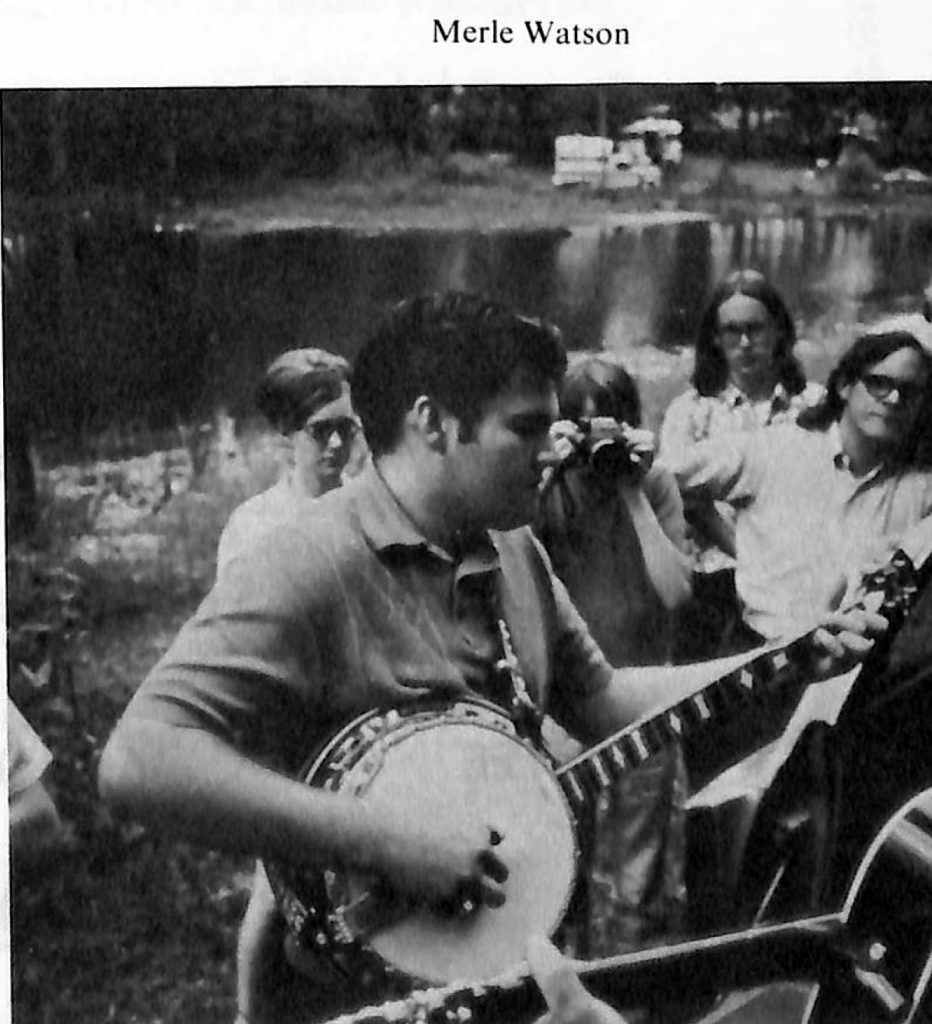
Doc’s music, as stated, is not of the purest form and consequently can be separated into three harmonious parts. First, the folk song from years past, preserved by the rural and common people. Second, “rural professional music”, as called by A. L. Lloyd, established during the late 19th century as a stylized folk-like music. Third, hillbilly, bluegrass & country-western. Out of all of these forms of music. Doc has chosen the best he could find.
Doc started with Jack Williams in a dance combo, playing “country swing” and continued playing off and on with Jack until 1963. In 1960 Doc played for the first time in New York city along with the late Clarence Ashley at Public School #47. He returned there again to play in 1961 with his father-in-law Gaither Carlton. Doc said he remembers playing for two hours and making $50.00 each. During the years between 1960-1963, Doc spent most of his time playing with Clarence Ashley, Fred Price and Clint Howard. He remembers that in 1962, he left Clarence Ashley long enough to play at the Ash Grove in Hollywood, California for two weeks and made enough money to send home to his wife and Merle so they could buy a roto-tiller. In December 1963 and February 1964, Doc returned to New York city to play at Gerdies Folk City. In November 1963, Doc made his first solo record on Vanguard. As a bit of guitar buffs trivia, Doc used Ralph Rinzler’s old D-28 Martin on his first LP, a Martin D-18 on “Home Again”, “Southbound”, & “Doc Watson and Son”. Merle used a Goya on “Southbound”, a J-45 Gibson on “Doc Watson and Son”. On his just released “Doc Watson on Stage”, Doc uses a custom-made Gallagher guitar from Gallagher Guitar Co. in Wartrace, Tennessee.
In 1963, Doc played his first folk festival at Swarthmore College. After he had been gone on his longest tour—around three months—he returned home to find that Merle, with the help of his mother, had learned to play guitar. Merle could play back-up on a number of Doc’s tunes and play a rhythm behind flat-picking tunes as solid as anyone. All of the accomplishments achieved by Merle should be attributed 99% to himself, as Doc says he has given Merle very little help because it hasn’t been necessary. The only real help Doc gave Merle, you could say, was genetic! Probably one of the proudest moments in Doc’s life came in 1964 when Merle joined his dad full time. Doc’s first bluegrass festival was in 1965 at Carlton Haney’s Roanoke festival.
I could continue for hours in regards to the Watson’s and their music; however space does not allow. I asked Doc if there was one time in his career when someone greatly influenced his future. His answer again was very spontaneous. After completing a week in New York city in the early 1960’s, he went to Philadelphia for a week’s engagement (at the Second Fret) before returning home. Doc says that he had been away from the mountains, the clean air, trees etc. for such a long time, that he was so homesick he would have done anything to be home with his family …. including playing professionally. A fellow by the name of Jery Ricks who worked in the kitchen told Doc, “you’re not going to make much money if you stay in a hotel, so come over and stay with me.” Doc did and said he was fed and treated like a king for a week. He thinks that if this hospitality hadn’t been extended at that time, he would probably never have continued to play.
The musicians and listeners I know who respect and love Doc and Merle’s music would strongly recommend to those of you who haven’t heard them, to study a man who is a towering figure in this competitive music field. A man who is unusually compassionate, a man who shows his affirmation of life and happiness in everything he does, how he lives his life and most of all how he treats his fellow man. This to me is Doc Watson; and his contribution to life and to music in this age of competition is untouchable by another musician.
